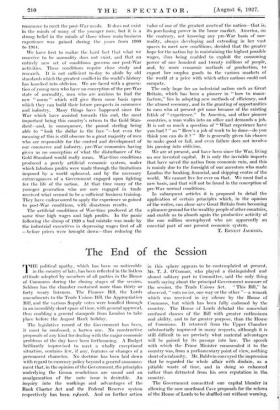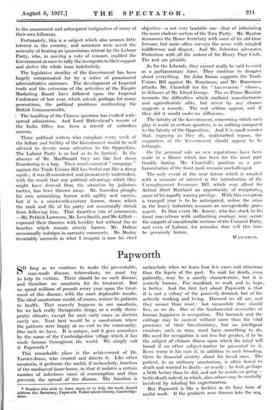The End of the Session
THE political apathy, which has been so noticeable in the country of late, has been reflected in the listless attitude adopted by members of all parties in the House of Commons during the closing stages of the session. Seldom has the chamber contained more than thirty or forty weary listeners. The Finance • Bill, the Lords amendments to the Trade Unions Bill, the Appropriation Bill, and the various Supply votes were bundled through in an incredibly short space of time, with general approval, thus enabling a general stampede from London to take place before the August Bank holiday.
The legislative record of the Government has been, it must be confessed, a barren one. No constructive proposals of any kind for dealing with the major economic problems of the day have been forthcoming. A Budget brilliantly improvised to meet a wholly exceptional situation, contains few, if any, features or changes of a permanent character. No doctrine has been laid down with regard to currency policy beyond a general announce- ment that, in the opinion of the Government, the principles underlying the Genoa resolutions are sound and an amalgamation of the note issue is desirable. An inquiry into the workings and advantages of the Bank Charter Ad and the Federal Reserve system respectively has been re/used. And no further action in this sphere appears to be contemplated at present. Mr. T. J. O'Connor, who played a distinguished and almost solitary part in Committee, said the only thing worth saying about the principal Government measure of the session, the Trade Unions Act. " This Bill," he observed, " cuts no ice, one way or the other "—a remark which Was received in icy silence by the House of Commons, but which has been fully endorsed by the country. The House of Lords debated the somewhat confused clauses of the Bill with greater enthusiasm and ability, and to far greater purpose, than the House of Commons. It returned from the Upper Chamber substantially improved in many respects, although it is still difficult to see precisely what material advantages will be gained by its passage into law. The speech with Which the Prime Minister commended it to the country was, from a parliamentary point of view, nothing short of a calamity. Mr. Baldwin conveyed the impression that he regarded the whole affair with disdain, as a pitiable waste of time, and in doing so enhanced rather than detracted from his own reputation in the country.
The Government committed one capital blunder in allowing the now moribund Cave proposals for the reform of the House of Lords -to -be shuffled out without warning, to the amazement and subsequent indignation of many of their own followers.
• Fortunately, this is a subject which also arouses little interest in the country, and ministers were saved the necessity of beating an ignominious retreat by the Labour Party, who, in moving a vote of censure, enabled the Government at once to rally the insurgents to their support and shelve the whole issue indefinitely.
The legislative sterility of the Government has been largely compensated for by a series of pronounced administrative successes. The development of Imperial trade and the extension of the activities of the Empire Marketing Board have followed upon the Imperial Conference of last year, which solved, perhaps for many generations, the political problems confronting the British Commonwealth.
The handling of the Chinese question has evoked wide- spread admiration. And Lord Birkenhead's tenure of the India Office has been a record of unbroken success.
Those political writers who complain every week of the failure and futility of the Government would be well advised to devote some attention to the Opposition. The Labour Party is so bad as to be farcical. In the absence of Mr. MacDonald they are like lost sheep floundering in a bog. Their much-vaunted " campaign against the Trade Unions Bill has fizzled out like a damp squib ; it was ill-considered, and prematurely undertaken, with the result that any political advantage which they might have derived from the situation by judicious tactics, has been thrown away. Mr. Snowden ploughs his own astonishing furrow with agility and success, but it is a nineteenth-century furrow, down which the rank and file of his party not unnaturally shrink from following him. That dauntless trio of economists —Mr. Pethick Lawrence, Mr. Lees Smith, and Mr. Gillett— expound 'their theories. with lucidity but without fire to benches which remain utterly barren. Mr. Dalton occasionally indulges in sarcastic comments. Mr. Mosley invariably succeeds in what I imagine is now his chief objective—a not very laudable one—that of infuriating the more choleric section of the Tory Party. Mr. Maxton denounces the Home Secretary with some of his old-time fervour, but more often surveys the scene with mingled indifference and disgust. And Mr. Johnston advocates Protection with all the ardour of Sir Henry Page Croft. The rest are pitiable.
As for the Liberals, they cannot really be said to exist as a parliamentary force. They continue to disagree about everything. Sir John Simon supports the Trade Unions Bill against Mr. Runciman, and Mr. Runciman attacks Mr. Churchill for his " tax-evasion " clause3, in defiance of Mr. Lloyd George. The ex-Prime Minister recounts the difficulties which confront manufacturers and agriculturists alike, but never by any chance suggests a remedy. The rest seldom appear, and if they did it would make no difference.
The fatuity of the Government, concerning which such play is made in certain quarters, is as nothing compared to the fatuity of the Opposition. And it is small wonder that, enjoying as they do, undisturbed repose, the supporters of the Government should appear to be lethargic.
On the personal side no new reputations have been made in a House which has been . for the most part frankly boring. Mr. Churchill's position as a par- liamentarian of the front rank remains unchallenged.
The only event of the near future which is awaited with _a measure of interest is the introduction of- the Unemployment Insurance Bill, which may afford Sir Arthur Steel Maitland an opportunity of recapturing some.of his rapidly waning prestige. With this exception a tranquil year is to be. anticipated, unless the crisis in the heavy industries assumes an unexpectedly .grave aspect. In that event :Mr. Amery, who has stuck to his fiscal convictions with unflinching. courage, may secure the support of considerable sections of the Unionist Party, and even. of Labour, for remedies that will this time be genuinely heroic.
WATCHMAN.







































 Previous page
Previous page